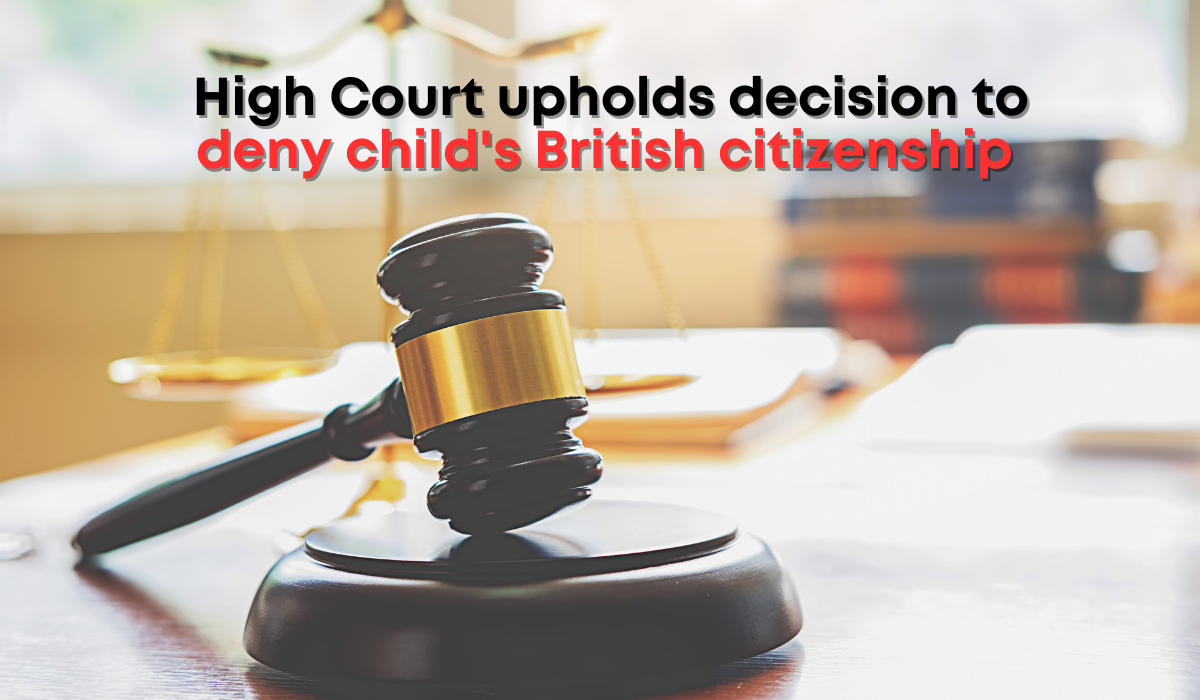In a recent ruling, the High Court upheld the Home Secretary’s decision to refuse to register child as a British citizen, despite providing only “barely stated” reasons. This decision, in the case of R (OBN (a minor) by his litigation friend ASM) v The Secretary of State for the Home Department [2024] EWHC 1833 (Admin), underscores the complexities and discretionary nature of the UK’s nationality laws.
Background of the Case
The claimant, born on December 19, 2013, in Bangladesh, arrived in the UK with his mother on September 13, 2020, at the age of six. He had leave to enter until April 22, 2023. His father, ASM, naturalised as a British citizen in 2021, and his sister was born as a British citizen on September 18, 2021. On February 25, 2023, ASM applied for his son to be registered as a British citizen under section 3(1) of the British Nationality Act 1981, which grants registration at the Home Secretary’s discretion.
The application was refused on April 26, 2023. The refusal letter stated that the claimant did not meet the criteria in the guidance because he was not settled, and while his father was British, his mother was not settled. The letter concluded, “I have considered whether there are grounds to exercise discretion to register you as a British citizen, however, I am not satisfied there are sufficient grounds to do so. As you are a child, I have considered your best interest in making this decision.”
Judicial Review Proceedings
ASM sought judicial review of this decision, arguing that the discretion under section 3(1) is broad and does not necessarily require the claimant or his mother to be settled in the UK. The claimant’s counsel referenced R (on the application of K (A Child)) v Secretary of State for the Home Department [2018] 1 WLR 6000, where the High Court acknowledged the open-ended nature of the Secretary of State’s discretion under section 3(1).
Additionally, the refusal letter was challenged for not adequately demonstrating that the Home Secretary had fulfilled the duty to safeguard and promote the claimant’s welfare under section 55 of the Borders, Citizenship and Immigration Act 2009. The letter’s statement, “As you are a child, I have considered your best interest in making this decision,” along with a URL link to guidance, was argued to be insufficient.
Preliminary Issue: Administrative Review
A preliminary issue was whether the claimant should have sought an administrative review of the decision, as advised in the refusal letter. The claimant bypassed this step, opting for judicial review instead. The Home Secretary argued that the claim should be dismissed for not exhausting all available remedies. However, the judge allowed the claim to proceed, noting that an administrative review was unlikely to have altered the decision, as evidenced by the detailed rebuttal in the pre-action response.
High Court’s Decision
The High Court ultimately upheld the Home Secretary’s decision. Judge O’Callaghan stated:
“I am satisfied that the reasons leading to the refusal to grant the claimant British citizenship are adequately, if somewhat barely, set out in the refusal letter. There is sufficient information contained in the refusal letter for those acting on behalf of the claimant to understand why he did not satisfy the criteria in the Guidance, and why after consideration of his best interests, the Secretary of State did not exercise his discretion to permit his registration as a British citizen.”
Reflective Analysis
This case highlights the discretionary nature of British nationality law and the stringent application of guidance criteria to register child as a British citizen. It also underscores the necessity for applicants to exhaust all available remedies, such as administrative reviews, before seeking judicial review.
The court’s acknowledgment of the “barely stated” reasons in the refusal letter raises concerns about transparency and the sufficiency of reasoning in decisions affecting children’s citizenship rights. The decision also reaffirms the importance of section 55 duties, which require a demonstrable consideration of a child’s best interests.
The ruling in R (OBN) v The Secretary of State for the Home Department serves as a crucial reminder of the complexities and discretionary powers inherent in the UK’s nationality laws. It emphasizes the need for thorough and transparent reasoning in administrative decisions, especially those impacting children’s futures. As practitioners and applicants navigate these intricate legal waters, this case will undoubtedly inform future challenges and policy considerations.
Get in touch: For a comprehensive understanding of your options or queries on UK immigration matters, contact GigaLegal Solicitors at 02074067654 or click here to book a no-obligation consultation with an immigration expert.


